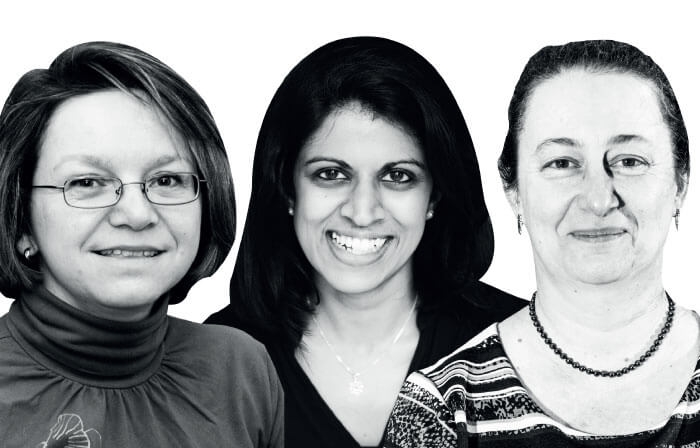
Gender inequality in ophthalmology and vision sciences is well described, but its causes are wide-ranging, making it difficult to know how best to address the gender gap. The Royal College of Ophthalmologists reports that only 31 percent of consultant ophthalmologists in the UK are female (1) and studies show that female principal investigators (PIs) on average obtain research grants with smaller monetary value than their male counterparts, especially early in their career (2). According to a recent survey of UK scientists, female PIs also have fewer staff and less access to laboratory space than their male peers (3). But what practical steps can be taken to help?
Women in Vision UK (WVUK) was founded in 2017 by Maryse Bailly, Julie Daniels and Mariya Moosajee, initially with the aim of developing a support network to help raise female profiles and to promote female representation at conferences and grant panel review bodies. The organization has grown from strength to strength, and 18 months and two national meetings later, membership is now close to 300. Members come from all disciplines within the clinical and vision sciences community, ranging from those embarking on their career to eminent leaders in the field. However, with such diversity, we wanted to determine our membership needs, what our annual conferences should cover, and what would truly make a difference to close the gap. Therefore, we developed a survey to evaluate current members’ profiles and requests, and set up benchmarks that could be assessed annually to evaluate progress.
Altogether, 106 members responded to the 2018 survey, representative of the breadth of WVUK membership, with respondents comprising of academics (40 percent), post-doctoral scientists or PhD students (15 percent), consultant ophthalmologists (10 percent), orthoptists (10 percent), optometrists (7 percent). Trainee ophthalmologists, those working in administration and the charity sector made up the remainder.
We enquired about academic impact measures to determine a baseline for our membership cohort, although there is little benchmark data to compare this with, given WVUK’s uniquely broad, inclusive membership. Of those who felt the question was applicable to them, 26 percent had been awarded a research grant as PI or co-PI in the last year; 30 percent were on one or more editorial boards, 69 percent had reviewed one or more paper, and 43 percent reviewed one or more grant.
The need for mentorship was highlighted by many and so was the clearest message of all. Although over 70 percent of respondents already acted as mentors in some capacity, most felt that mentoring at every stage of their career would be beneficial. A substantial number of requests were made for early career meetings, a formal mentorship scheme, peer mentorship with regards to grant applications – specifically, those whose role is mainly clinical wanted to know how to embark on research projects. These findings are not dissimilar to those found in other specialties, such as in obstetrics and gynecology, where significantly fewer women had mentors compared with men; here too, many more women had doubts over their ability to succeed at an academic career compared with their male counterparts (4). Many women can identify with the feeling of “imposter syndrome” in the workplace, which can result in the uptake of less prominent positions within organizations – usually more geared towards “doing” rather than “leading.” Therefore, it is essential that we promote women’s achievements to demonstrate our successes – both to ourselves and to others.
Collaboration also featured frequently in the survey results. The power of collaboration in developing research is well known (5) and WVUK has already partnered with Fight for Sight and with WEAVR, the US-based group championing women’s achievement. In addition, there were several requests to further promote networking and collaboration opportunities, or even to develop a database of members willing to collaborate; we hope that WVUK can provide such a platform.
A unifying theme in both mentorship and collaboration is establishing a network, which brings us full circle to the founding aims of WVUK. With growing numbers of women embarking on careers in both ophthalmology and visual sciences, taking steps to address these areas and promote equality will no doubt help the productivity of our workforce.
Further details on the 2018 WVUK survey can be found at: https://www.ucl.ac.uk/ioo/women-vision-uk
References
- RCOphth, “Workforce Census 2018” (2019). Available at: https://tinyurl.com/yywn9cgk. Accessed May 9, 2019. PF Svider et al., “Gender differences in successful National Institutes of Health funding in ophthalmology”, J Surg Educ, 71, 680 (2014). PMID: 24776863. Nature, “Female scientists get less money and staff for their first labs” (2019). Available at: https://tinyurl.com/y42zqota. Accessed May 9, 2019. L Berlingo et al., “Women and academic careers in obstetrics and gynaecology: aspirations and obstacles among postgraduate trainees - a mixed-methods study”, BJOG, 126, 770 (2019). PMID: 30506800. R Lee, “The researcher of the future... develops powerful networks”, Lancet, 381 Supp 1 (2013). PMID: 23452933.
